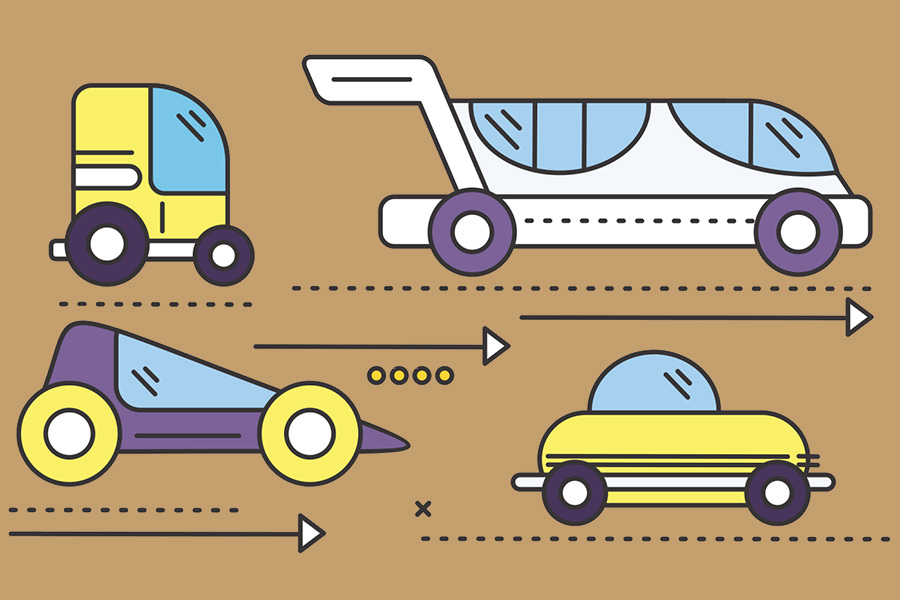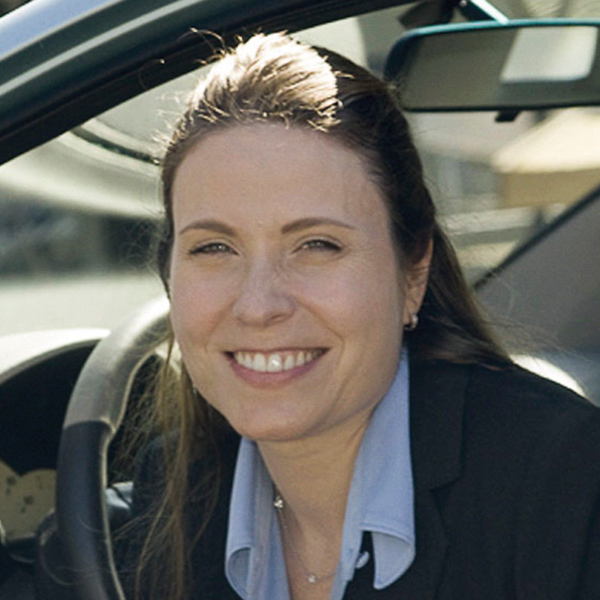THEIR LIFE'S WORK
Drive Time
Driven by the science of mobility, Susan Shaheen '88 works to shape public policy by understanding today’s transportation trends while anticipating those of tomorrow.
by Sofia Tokar

Think about how you got to work or ran errands today. Did you walk or bike, drive your car or hail a cab, take public transportation or order a ride via smartphone? Maybe you chose some combination of ways—or maybe it felt like you didn’t have a choice at all.
“Transportation touches nearly every dimension of our lives,” says Susan Shaheen '88, Ph.D., who majored in political science and English (with a writing concentration) at Nazareth. “As we think about the future, we have to ask ourselves how we can make mobility more seamless for the entire population—and that’s a really exciting challenge.”
Shaheen has dedicated her education and career to addressing that challenge. Although post-doctoral research work initially brought her to the University of California, Berkeley, she is now the co-director of the university’s Transportation Sustainability Research Center and a professor in civil and environmental engineering. Shaheen leads research efforts exploring transportation mobility, specifically its environmental, social, technological, and economic aspects. “I’ve always been interested in advanced technology, especially with an eye toward the larger goal of improving society and the environment.”
California has proven fertile ground for her interests and efforts, not least because the state is often on the vanguard of progressive public policy efforts in the nation. UC Berkeley, meanwhile, is located close to the San Francisco Bay Area, often referred to as the “innovation capital of the world,” partly because it houses Google, Facebook, Apple, Tesla Motors, LinkedIn, and other high-tech innovators and developers.
Working with technology giants, governmental agencies, as well as the automotive industry, Shaheen and her team take a quantitative approach to understanding advancements in mobility. They mine big data from their industry partners, conduct surveys and interviews, augment their results with geographic and socio-demographic information, and then parse the numbers. One of their studies, covered in Time Magazine, examines how shared ride services in the U.S. have evolved with the advent of smartphone applications and ride-hailing services (indeed, Shaheen is the principal investigator of the first-ever study on the environmental impacts of the ride-hailing companies Uber and Lyft, in concert with the Natural Resources Defense Council). The findings from such research can then help inform public policy involving shared mobility.
Given her expertise, Shaheen is often asked to speculate on the future of transportation mobility—that highly anticipated world of self-driving and flying cars. “In many ways, that future is already here,” she explains. “Automated cars have existed since the late 1990s and the use of transportation drones continues to expand. The car is not going away, but the role of the car in society is changing.”
Consider the following: A typical automobile today sits unused 95% of the time. It’s also the second largest expenditure for many households. What if there was a way for people to monetize their otherwise unused transportation assets—cars, but also bikes and scooters—by sharing them with others as needed, a kind of Airbnb for vehicles?
“Technology is disrupting traditional transportation models, as well as how we feel about movement and acquiring goods. People have more information and choices than ever before.” And while issues of scaling, sustainability, digital equity, and privacy (among others) will impact the future of shared mobility and transportation worldwide, Shaheen trusts in what the data reveal: “The more robust the transportation options, the higher the quality of life.”
Sofia Tokar is a freelance and web writer in Rochester, New York.

Susan Shaheen '88